6. Brokeback Mountain (Gustavo Santaolalla)

Many people who didn’t see the movie know about him. “Brokeback Mountain“ aroused a huge medial debate about the presentation of homosexuality in cinema; in fact, in 2005 it was a strong statement by the film industry to make Ang Lee’s movie such an awarded release (even if the renouncement of awarding “Brokeback Mountain” the Oscar for Best Picture has a highly displeasing aftertaste, and has provoked a lot of criticism relating to possible homophobic reasons).
“Brokeback Mountain” is a personal story about the secret love between two cowboys. After meeting and falling in love during a shared summer job, they can only see each other during irregular time intervals because of their marriages and the society’s sexual intolerance.
The score knows how to transfer this personal story into heartwarming music. The soundtrack’s instrumental ensemble consists of one acoustic guitar, a slide guitar, and a small section of strings. This is what makes the music as intimate as the movie’s narrative. In particular, the guitar tracks spray a free vibe and sound, like a man sitting at a campfire playing his tunes. This perfectly fits to the movie’s main theme – freedom. In the beautiful and wide nature, both cowboys are free from social conventions and religious rules.
Regarding its length, the score of “Brokeback Mountain” is clear, and long passages of the movie are filled with silence. But instead of appearing uninspired, this shortness makes the music even more powerful. It’s a prime example of simplicity enhancing the score’s emotional effect.
5. The Social Network (Trent Reznor & Atticus Ross)

Trent Reznor and Atticus Ross definitely left their marks on the music industry with Nine Inch Nails and their highly artistic approach. For David Fincher’s movie in 2010 about Mark Zuckerberg and the initial rise of Facebook, they transmitted their trademark into a cinematic context, and without a doubt, they deserve their Oscar.
Nearly the entire score is electronic based and sprays a futuristic vibe, working as the perfect acoustic equivalent to the digital revolution Facebook would become – humans and computers in symbiotic co-existence.
The main theme is built around one of the catchiest piano melodies in movie history, highlighted with a thrilling and steady synth tone and dark bass, foreshadowing some of the dubious actions of the movie’s protagonist. The whole score pays appreciated tribute to its theme. Some tracks could be described as dance-inspired 4/4 compositions, fitting into the collegiate environment of the movie, while other songs emanate deep emotions and pure ambition.
Regarding “The Social Network” as the cornerstone for the virtuoso and efficient collaboration between the two music veterans and mastermind David Fincher, this brilliant score gains even more relevance.
4. Atonement (Dario Marianelli)

What separates the score of Dario Marianelli from the others is the brilliant use of a movie-intern attribute – the typewriter. Blurring the line between score and sound design, the characteristic sound is a bracing element and arranges for an acoustic warmth, especially in tracks like “Come Back” and “Briony”. The metallic impacts of the letter pads work like subtle precursors for the upcoming ones in the story.
But that doesn’t sum up the entire greatness of this versatile score. On the one hand, the music appears as an evil foreshadowing cloud on the dark horizons of the screen, and on the other hand, the score is the perfect musical treatment for the emotional love story.
The core of the score is definitely “Elegy for Dunkirk”, a human ode to the cloudy darkness of war gleamed by promising shafts of sunlight; a dense and melancholic string composition, intersected by a male choir singing for peaceful times and forgiveness for mankind. The perfect musical symbiosis of deep grief and hopeful joy.
The soundtrack of “Atonement” is one of the greatest approaches of transferring emotions into music, and might be one of the best romantic drama scores in movie history.
3. Gravity (Steven Price)

This mesmerizing space journey has a couple of excellent features with Emmanuel Lubezki’s breathtaking long shots, Alfonso Cuarón’s immersive way of directing, and the stunning special effects. But this numeration wouldn’t be complete without the excellent and original use of sound with its realistic approach.
In space, there is no sound. That’s common sense. But the bigger part of sci-fi movies ignored this physical condition by adding highly cinematic sound design. In contrast, the sound design of “Gravity” is brilliantly cautious. Therefore, the soundtrack by Steven Price has more room to develop, which led to one of the greatest scores ever in sci-fi and cinematic history. Reaching from emotional tracks to very dark ones, the score is very versatile without losing a distinct aesthetic.
Regarding fear as one of the main narrative features of “Gravity”, the music perfectly picks it up and creates an ambience for the dark infinity of space with its combination of orchestral elements and sinister synthesizer sounds. Price’s score bursts with its energetic tension and musical power, while still offering deeply touching compositions such as the album-ending title track.
To name a highlight is difficult, but “Debris” is a musical monster with a massive build-up from behind, foreshadowing a looming danger, and a release, transferring the deadly peril the protagonists are confronted with.
2. Babel (Gustavo Santaolalla)

The second contribution from Gustavo Santaolalla to this list is his work for mastermind Alejandro González Iñárritu and his movie “Babel”. The story of this portmanteau film revolves around an ominous shot that injures an American tourist on a bus trip in Morocco, just to pull down the complex narrative to an absolute minimum.
In manner of “Brokeback Mountain”, the score has strong roots in guitar-based music and one gets to see once more the composer’s brilliant capability of transferring beautiful cinematography of nature into coherent and deeply touching music. But for “Babel”, he takes a more avant-garde approach without denying his distinctive roots.
His compositions are spheric soundscapes, polyrhythmic percussion hymns, or folk-inspired vocal songs. But what stands out the most is Santaolalla’s charango playing. Tracks like “Iguazu” offer something new to the audience aside Hollywood’s well-known string compositions and give the score an absolut unique vibe.
While many of today’s scores are truly entertaining and fit the movies tone, Santaolalla’s music is much more than this. His work is a mesmerizing journey into foreign cultures while unearthing intense emotions the audience has to deal with long after the screen changes to black.
1. The Lord Of The Rings: The Fellowship Of The Ring / The Return Of The King (Howard Shore)

Peter Jackson’s record-breaking trilogy took the world by storm. Never before has a fictional world become such an impressive cinematic treatment, and every department did a masterful job, setting the standards for Hollywood productions until today. However, one of the main features regarding why Middle Earth came so perfectly to life is the unique score by mastermind Howard Shore.
Richard Wagner’s technique of leitmotif isn’t new to the world of cinema, but Shore pushed it to the top with his groundbreaking soundtrack for one of the best movie trilogies of all time.
From the idyllic harmonies of the Shire to the mysterious melody of the One Ring, every species, every location, and even some relicts have their own themes. Who saw the movie knows that it is impossible to hear these melodies without thinking of the correspondent part in the movie. Listing every brilliant scene of the movie here would crash the count.
From the heartbreaking battle between Gandalf and the Balrog, to the heroic death of Boromir, or the growing evil of Saruman’s Isengard and the rise of the Uruk-Hai, every scene has the perfect musical counterpart. A proverb says: Pictures address the brain and music addresses the heart. This fits for Shore’s masterpiece.
Primarily, “The Lord Of The Rings“ is about friendship, good and evil, courage and love, and the score knows how to transform this narrative into pure musical emotions. Just remember the ride of the Rohirrim in order to help Gondor win the battle of Minas Tirith against thousands of bloodthirsty orcs, or Pippin singing for the blinded sewer while his son rides in his certain destruction.
Soundtracks are made for the movies. No more, no less. But Shore’s epic score is much more than that. It is a modern magnum opus and perhaps the best motion picture score ever composed.
Author Bio: Berlin-based Luc Hinrichsen has a bachelor’s degree in audio engineering and plenty of experience in scoring movies on his own. Beside that, he is an aspiring screenwriter and director always curious about enlarging his knowledge about film and its history.